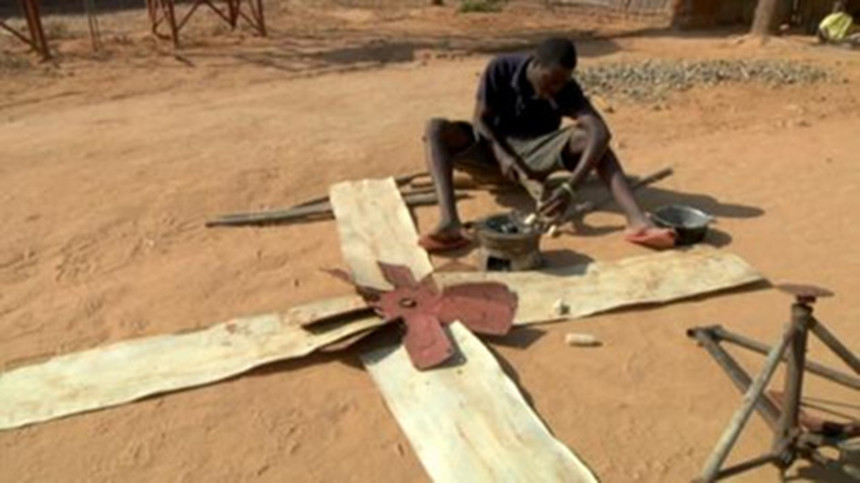Hot Docs 2013 Review: WILLIAM AND THE WINDMILL Subverts the Expected TEDtalk Narrative

What exactly is William and The Windmill about? Is it the story of a resourceful and ingenious young Malawi boy who builds a windmill from available detritus using diagrams in a book so his parents have a way to power their water pump during a particularly nasty African drought? Or is it the story of affluent white philanthropists (Including Amazon founder, Jeff Bezos' parents Jacklyn and Mike) who are caught up in their own benevolent idealism? If you go and watch the second of William Kamkwamba's Technology Entertainment Design (TED) talks - the first one is featured in the film, but at age 17 he is more deer in headlights than anything else - he comments on that experience in retrospect something to the effect of, "I'd never seen surround by so many azungu - white people. " There is another exchange in the Ben Nabor's documentary where the filmmaker asks William point blank what he wants for his life, rather than what other people want for his best interest. There is confusion to such a naked question, as William seems to perpetually wear a cloak of semi-dignified acquiescence. This moment might be best one in the film, which tells, but barely shows the event when William was 14.
We do see a very hands-on and in control William hard at work on maintaining his electrical circuits and home-made windmills in the golden-yellow Malawian sun, only to be carted off and paraded around the world on a book tour, spend time in many generic hotel and dorm rooms, and encounter his first elevator in New York City. Watching a wide-eyed Kamkwamba dwarfed by an endless California field of gigantic white wind turbines also speak for itself. Is the solution to empowering bright young Africans to drag themselves out of subsistence living, introducing them to "White People Problems?" as much as the pure science? William seemed just fine doing work within his community with cast-off spare bicycle parts and bottle caps rather than becoming a minor internet celebrity, with all the baggage that goes with that.
Thus the film is not really about the nobility of the spirit and can-do attitude when William was helping his family - despite his being unable to attend school. Rather, and perhaps I'm being overly cynical about the feel-good nature of TED conference sound-bytes, it is the complex and confusing road of a young man who now has to handle a surprise reputation ("I'm the Windmill Boy.") and its accompanying set of expectations while preparing for the future which his benefactors (and fans) desire for him based on first world expectations and processes. William seems grateful at the opportunity to attend a pan-African prep school. He is humbled at being offered a scholarship (sight unseen) to a prestigious Ivy League university (and surprised that the rest of the students have to pay $50K per year for the privilege.) And yet, it seems that his celebrity gets in the way of his studies to a very great degree.
Where is the line that the maintenance outweighs the benefit? His 'handler,' regular TEDer Tom Reilly has a certain self-awareness of this as he espouses the devotion of seven years of his life to William's 'upbringing.' Curiously, to my eyes, Reilly comes across as a much a villain, albeit one with the best of intentions. A scene where Reilly and his house companion make eggs and offer orange juice to an idly uncomfortable William during one of the transitions on the journey from tour to school is, to me, a bit unsettling in its mundaneness. This may simply be a product of what I'm bringing into my viewing of the film, my own vague-white-guilt. I think William and the Windmill is most interesting when exploring the divide between theory and practice in a disproportionately globalized world. Or, for that matter, the nature of charity.
In the final moments of the film, Kamkwamba, speaks with a directness that is either confidence at being on the dog-and-pony circuit for so long, or merely continuing his pavlovian pantomime to his benefactors wishes (and current audience.) He dryly intones "I'll reach a point where I feel in control of my life." Something that he actually had when it was 14 years old with some spare bicycle, copper wire and a few diagrams on how to generate electricity.
William and the Windmill
Director(s)
- Ben Nabors
Cast
- William Kamkwamba
- Tom Rielly







